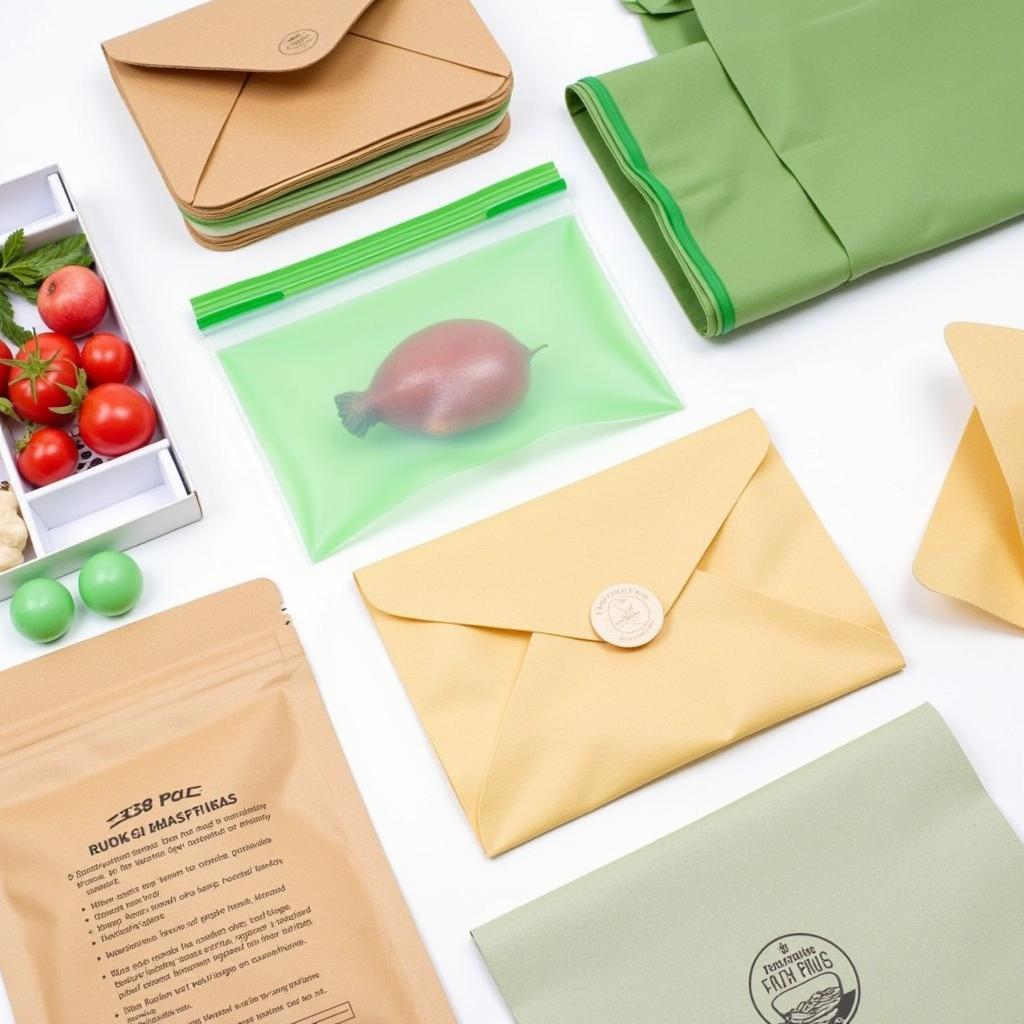The ubiquitous food plastic bag. A staple in kitchens worldwide, yet often at the heart of debates surrounding sustainability and environmental impact. Whether you’re prepping a quick snack or storing leftovers, understanding the role of food plastic bags in our daily lives is essential.
The Convenience and Concerns of Plastic
Let’s face it, plastic food bags are undeniably convenient. They’re lightweight, flexible, and readily available, making them a go-to for packing lunches, storing sandwiches, or portioning out snacks. Their ability to seal in freshness and prevent spills is unmatched, simplifying our meal prep routines and on-the-go lifestyles.
However, this convenience comes at a cost. The environmental impact of plastic, particularly single-use plastics like many food bags, is a growing concern. Their slow decomposition rates and potential to end up in landfills or contribute to pollution have led many to seek more sustainable alternatives.
Exploring Alternatives: Non Plastic Bags for Food
Thankfully, the rise in eco-consciousness has ushered in a wave of innovative solutions, including a range of non plastic bags for food. These alternatives are designed to deliver the same functionality as traditional plastic bags while minimizing environmental impact.
Reusable Options:
- Silicone Food Storage Bags: Known for their durability and reusability, these bags are perfect for storing leftovers, marinating meats, or freezing fruits and vegetables.
- Beeswax-Coated Cloth Wraps: These natural wraps offer a sustainable solution for wrapping sandwiches, cheeses, or covering bowls.
Compostable Choices:
- Biodegradable Plastic Bags: Made from plant-based materials, these bags break down significantly faster than traditional plastic, reducing their impact on landfills.
- Paper Bags: While not suitable for all types of food storage, paper bags provide a recyclable and compostable option for carrying groceries or packing baked goods.
 Sustainable Food Storage Options
Sustainable Food Storage Options
Making Informed Choices: Food Safe Plastic Bags
Even as we embrace alternatives, there are times when using plastic storage bags for food might be unavoidable. In these cases, it’s crucial to prioritize food safe plastic bags and adopt responsible disposal practices.
Look for the Labels:
- BPA-Free: Ensure your bags are made without Bisphenol A (BPA), a chemical that can potentially leach into food.
- Food-Grade Plastic: This designation indicates the plastic is safe for direct contact with edibles.
Responsible Disposal:
- Recycle When Possible: Check local regulations to determine which types of plastic bags are accepted for recycling in your area.
- Proper Disposal: When recycling isn’t an option, dispose of plastic bags responsibly in designated trash receptacles to prevent littering and environmental harm.
“Choosing the right food storage option is about finding a balance between practicality and sustainability,” says Sarah Jones, a food safety expert. “By understanding the pros and cons of different materials and prioritizing responsible practices, we can all make informed choices that benefit both our kitchens and the planet.”
Beyond the Bag: Minimizing Food Waste
While choosing the right food storage plays a vital role in reducing plastic waste, addressing the issue of food waste is equally crucial.
Here are some tips to minimize food waste in your kitchen:
- Plan Your Meals: Create a meal plan to avoid overbuying and ensure you utilize all ingredients.
- First In, First Out: Organize your fridge and pantry to use older items before they expire.
- Proper Storage: Store food correctly to maintain freshness and prolong its shelf life.
- Get Creative with Leftovers: Repurpose leftovers into new dishes to reduce food waste.
- Composting: Start a compost bin to recycle food scraps and reduce the amount of organic waste sent to landfills.
Conclusion: Food Plastic Bags in a Changing World
The debate surrounding Food Plastic Bags highlights the complex intersection of convenience, environmental concerns, and consumer choices. By understanding the impact of our decisions and embracing sustainable alternatives whenever possible, we can all contribute to a greener future. Remember, small changes in our daily routines can have a significant positive impact on the planet. So, the next time you reach for a large plastic food bag or consider purchasing clear plastic bags for food, take a moment to consider the alternatives and make the choice that aligns with your values.
FAQ
1. Are all plastic food bags recyclable?
Not all plastic food bags are recyclable. Check local regulations and the labels on the bags for guidance.
2. What are the best alternatives to plastic sandwich bags?
Reusable silicone bags and beeswax-coated cloth wraps are excellent alternatives to plastic sandwich bags.
3. How can I ensure my plastic food storage bags are safe?
Look for bags labeled as BPA-free and food-grade plastic.
4. What’s the best way to dispose of plastic bags that can’t be recycled?
Dispose of them responsibly in designated trash receptacles to prevent littering.
5. How can I reduce my reliance on plastic bags in the kitchen?
Meal planning, proper food storage, and embracing reusable alternatives are great ways to reduce plastic bag use.
Need further assistance with food storage solutions or have questions about our products? Contact us at Phone Number: 02437655121, Email: minacones@gmail.com. You can also visit us at 3PGH+8R9, ĐT70A, thôn Trung, Bắc Từ Liêm, Hà Nội, Việt Nam. Our dedicated customer support team is available 24/7 to assist you.
For more insights into sustainable food storage options, explore our articles on non plastic bags for food and food safe plastic bags. Let’s work together towards a greener and more sustainable future!